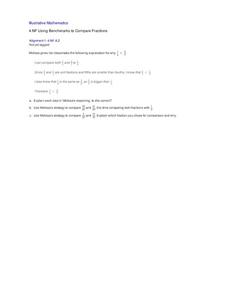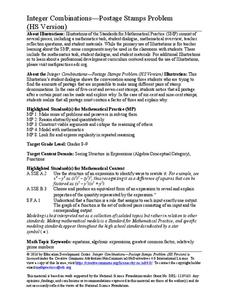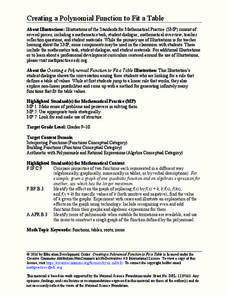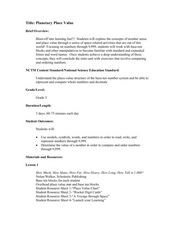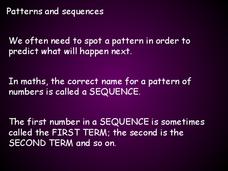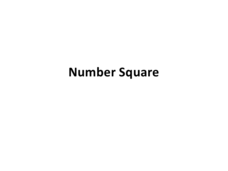Illustrative Mathematics
Using Benchmarks to Compare Fractions
Introduce a new strategy for comparing fractions by analyzing Melissa's use of benchmarks. Walk the class through her process, calling on students to explain their understanding of each step she took. Then practice this method on two...
BW Walch
Solving Systems of Linear Inequalities
One thing that puzzles a lot of young algebrists is the factors in a word problem that are taken as "understood". This presentation on solving systems of linear inequalities does a great job walking the learner through how to tease those...
California Education Partners
T Shirts
Which deal is best? Learners determine which of two companies has the best deal for a particular number of shirts. They begin by creating a table and equations containing each company's pricing structure....
Curated OER
How Many Raisins?
Students study the concept of addition. They create verbal number stories with numbers from one to five. They draw a slice of bread with a line down the middle and cut the bread shapes out of a "slice of bread" and a handful of raisins,...
West Contra Costa Unified School District
Multiplying Numbers
Provide families with the guidance needed to support their child's proficiency in multiplying numbers. Three pages offer detailed descriptions and labeled examples.
Education Development Center
Integer Combinations—Postage Stamps Problem (HS Version)
It seems the post office has run out of stamps! Learners build all the values of postage available if the post office only sells five- and seven-cent stamps. The task provides an opportunity to create an expression in two variables and...
Education Development Center
Integer Combinations—Postage Stamps Problem (MS Version)
Number patterns can seem mysterious. Help your learners unravel these mysteries as they complete an intriguing task. Through examination, collaborative groups determine that they are able to produce all integers above a certain...
Education Development Center
Creating a Polynomial Function to Fit a Table
Discover relationships between linear and nonlinear functions. Initially, a set of data seems linear, but upon further exploration, pupils realize the data can model an infinite number of functions. Scholars use multiple representations...
Curated OER
It's Not All Greek to Me
Learners find out the meaning for prefixes used in math vocabulary. By dissecting words used in everyday math, they figure out what the prefix indicates and what the word means. A variety of well-organized worksheets and activities...
Curated OER
Planetary Place Value
Third graders explore place value to the ten thousands place. This incredibly thorough, 24-page lesson has learners construct, order, and compare numbers to 9,999. This three-day lesson includes reteaching and extension activities...
Curated OER
Once Upon A Math Story
Students write a math story. In this math operations and writing lesson, students work in small groups to brainstorm ideas for a math story, write a rough draft, revise their story, edit their story and add clip art. Students...
Curated OER
Number Line Locomotion
Here is a great lesson that incorporates movement into academic learning. Students improve addition subtraction skills by using number lines and locomotor movement.
Curated OER
Counting Gorillas 1 to 5
In this counting one to five learning exercise, learners practice object number relationships. Students count and color gorillas to solve the two problems.
Curated OER
Patterns and Sequences
A very well done slide-show defines and explains how numeric patterns and sequences work. Academic vocabulary is highlighted as well as solid examples and whole class practice. The last slide contains four number sequences for the class...
Curated OER
Multiplication Tables: 9's Tricks
Who knew two hands could solve so many problems? Kids learn the 9's times tables trick with their fingers, then work through a series of 9's related math problems intended on building strong number sense and pattern recognition. Great...
Curated OER
Counting on a 100 Square
Counting by twos, fives, and tens is a great way to build the skills and number sense needed to better grasp the concept of multiplication later on. Here are six number charts to 100, each chart is highlighted and requires the class to...
Curated OER
Making 10 Game
What a perfect tool to use at a math or independent learning center! Kids are shown an equation that makes 10, and choose the number that completes the each equation. There are 10 equations total and each time the choose correctly a...
EngageNY
Percent of a Quantity
Visualize methods of finding percents. Classmates find a percent of a quantity using two methods including a visual model in the 26th lesson in a series of 29. By the end of the lesson, scholars find percents given a part and the whole...
California Education Partners
Cady's Cats
How much can a cat eat? The five-question fraction assessment asks pupils to determine the fractional portion of a food box eaten by cats. Learners show their proficiency in adding and subtracting fractions using several scenarios...
Curated OER
Reading and Writing Numbers
Reading and writing numbers is thoroughly covered in this well done slide-show presentation. Learners will see how number and number words correlate in relation to place value. The slide-show is text heavy and could use more visual aids...
Noyce Foundation
Perfect Pair
What makes number pairs perfect? The resource provides five problems regarding perfect pairs of numbers, the definition of which changes in complexity with each task. Solutions require pupils to apply number sense and operations, as well...
Education Development Center
Choosing Samples
What makes a good sample? Your classes collaborate to answer this question through a task involving areas of rectangles. Given a set of 100 rectangles, they sample a set of five rectangles to estimate the average area of the figures. The...
Curated OER
Integers - Objects Model
Sixth and seventh graders solve 19 various types of problems related to integers as objects models. They write an integer that corresponds to each letter on a number line and then, arrange the integers from least to greatest. Pupils also...
Noyce Foundation
The Wheel Shop
Teach solving for unknowns through a problem-solving approach. The grouping of five lessons progresses from finding an unknown through simple reasoning to solving simultaneous equations involving three and four variables. Each lesson...
